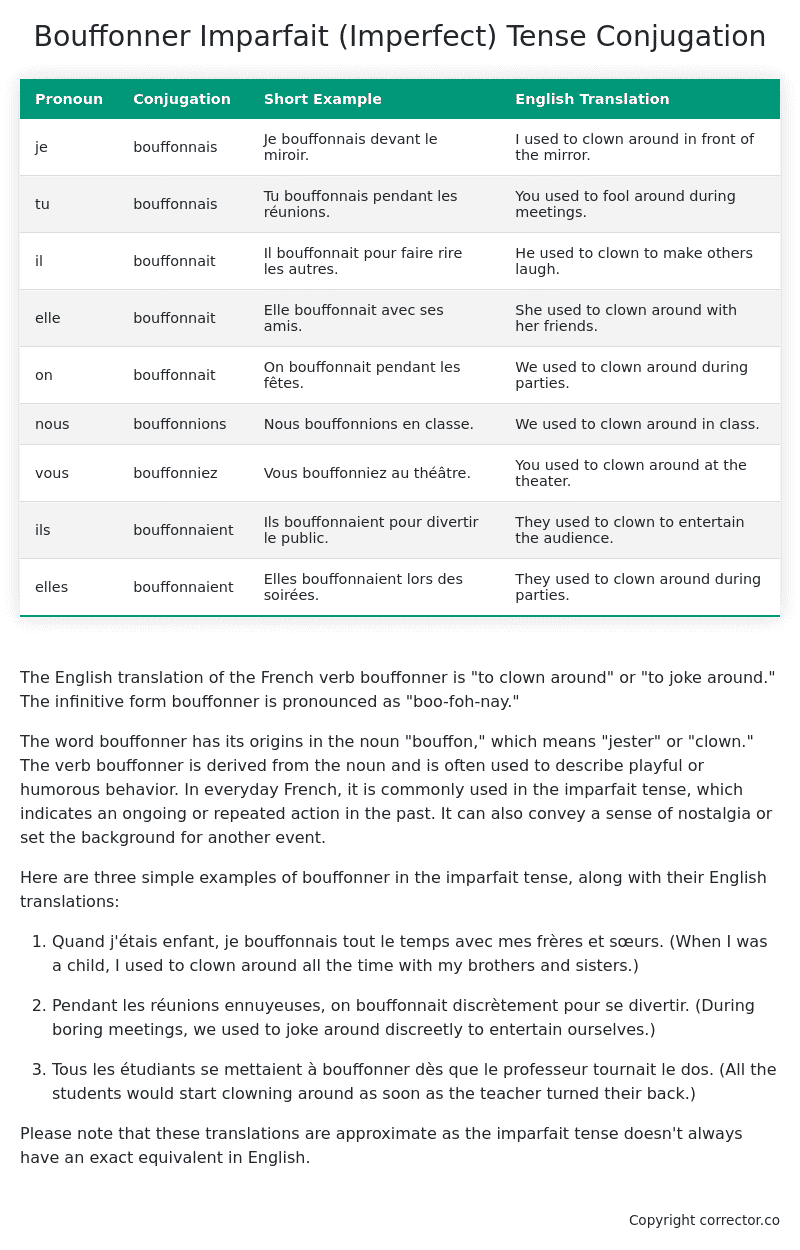Imparfait (Imperfect) Tense Conjugation of the French Verb bouffonner
Introduction to the verb bouffonner
The English translation of the French verb bouffonner is “to clown around” or “to joke around.” The infinitive form bouffonner is pronounced as “boo-foh-nay.”
The word bouffonner has its origins in the noun “bouffon,” which means “jester” or “clown.” The verb bouffonner is derived from the noun and is often used to describe playful or humorous behavior. In everyday French, it is commonly used in the imparfait tense, which indicates an ongoing or repeated action in the past. It can also convey a sense of nostalgia or set the background for another event.
Here are three simple examples of bouffonner in the imparfait tense, along with their English translations:
-
Quand j’étais enfant, je bouffonnais tout le temps avec mes frères et sœurs.
(When I was a child, I used to clown around all the time with my brothers and sisters.) -
Pendant les réunions ennuyeuses, on bouffonnait discrètement pour se divertir.
(During boring meetings, we used to joke around discreetly to entertain ourselves.) -
Tous les étudiants se mettaient à bouffonner dès que le professeur tournait le dos.
(All the students would start clowning around as soon as the teacher turned their back.)
Please note that these translations are approximate as the imparfait tense doesn’t always have an exact equivalent in English.
Table of the Imparfait (Imperfect) Tense Conjugation of bouffonner
| Pronoun | Conjugation | Short Example | English Translation |
|---|---|---|---|
| je | bouffonnais | Je bouffonnais devant le miroir. | I used to clown around in front of the mirror. |
| tu | bouffonnais | Tu bouffonnais pendant les réunions. | You used to fool around during meetings. |
| il | bouffonnait | Il bouffonnait pour faire rire les autres. | He used to clown to make others laugh. |
| elle | bouffonnait | Elle bouffonnait avec ses amis. | She used to clown around with her friends. |
| on | bouffonnait | On bouffonnait pendant les fêtes. | We used to clown around during parties. |
| nous | bouffonnions | Nous bouffonnions en classe. | We used to clown around in class. |
| vous | bouffonniez | Vous bouffonniez au théâtre. | You used to clown around at the theater. |
| ils | bouffonnaient | Ils bouffonnaient pour divertir le public. | They used to clown to entertain the audience. |
| elles | bouffonnaient | Elles bouffonnaient lors des soirées. | They used to clown around during parties. |
Other Conjugations for Bouffonner.
Le Present (Present Tense) Conjugation of the French Verb bouffonner
Imparfait (Imperfect) Tense Conjugation of the French Verb bouffonner (You’re reading it right now!)
Passé Simple (Simple Past) Tense Conjugation of the French Verb bouffonner
Passé Composé (Present Perfect) Tense Conjugation of the French Verb bouffonner
Futur Simple (Simple Future) Tense Conjugation of the French Verb bouffonner
Futur Proche (Near Future) Tense Conjugation of the French Verb bouffonner
Plus-que-parfait (Pluperfect) Tense Conjugation of the French Verb bouffonner
Passé Antérieur (Past Anterior) Tense Conjugation of the French Verb bouffonner
Futur Antérieur (Future Anterior) Tense Conjugation of the French Verb bouffonner
Subjonctif Présent (Subjunctive Present) Tense Conjugation of the French Verb bouffonner
Subjonctif Passé (Subjunctive Past) Tense Conjugation of the French Verb bouffonner
Subjonctif Imparfait (Subjunctive Imperfect) Tense Conjugation of the French Verb bouffonner
Subjonctif Plus-que-parfait (Subjunctive Pluperfect) Tense Conjugation of the French Verb bouffonner
Conditionnel Présent (Conditional Present) Tense Conjugation of the French Verb bouffonner
Conditionnel Passé (Conditional Past) Tense Conjugation of the French Verb bouffonner
Conditionnel Passé II (Conditional Past II) Tense Conjugation of the French Verb bouffonner
L’impératif Présent (Imperative Present) Tense Conjugation of the French Verb bouffonner
L’impératif Passé (Imperative Past) Tense Conjugation of the French Verb bouffonner
L’infinitif Présent (Infinitive Present) Tense Conjugation of the French Verb bouffonner
L’infinitif Passé (Infinitive Past) Tense Conjugation of the French Verb bouffonner
Le Participe Présent (Present Participle) Tense Conjugation of the French Verb bouffonner
Le Participe Passé (Past Participle) Tense Conjugation of the French Verb bouffonner
Struggling with French verbs or the language in general? Why not use our free French Grammar Checker – no registration required!
Get a FREE Download Study Sheet of this Conjugation 🔥
Simply right click the image below, click “save image” and get your free reference for the bouffonner imparfait tense conjugation!

Bouffonner – About the French Imparfait Tense
NOTE: To take a deep dive into all the French tenses then see our article on Mastering French Tense Conjugation.
Formation of the Imparfait Tense
For regular -er verbs:
For regular -ir verbs
For regular -re verbs
Common Everyday Usage Patterns
Description of Past Habits
Background Information
Mental and Emotional States
It’s employed to express emotions, thoughts, or physical sensations in the past. For example: “J’étais content quand il est arrivé.” (I was happy when he arrived.)
Ongoing Actions
Points to Note About the Imparfait Tense
Passé Composé vs. Imparfait
Conditional
Si Clauses
Narration
I hope you enjoyed this article on the verb bouffonner. Still in a learning mood? Check out another TOTALLY random French verb imparfait conjugation!


